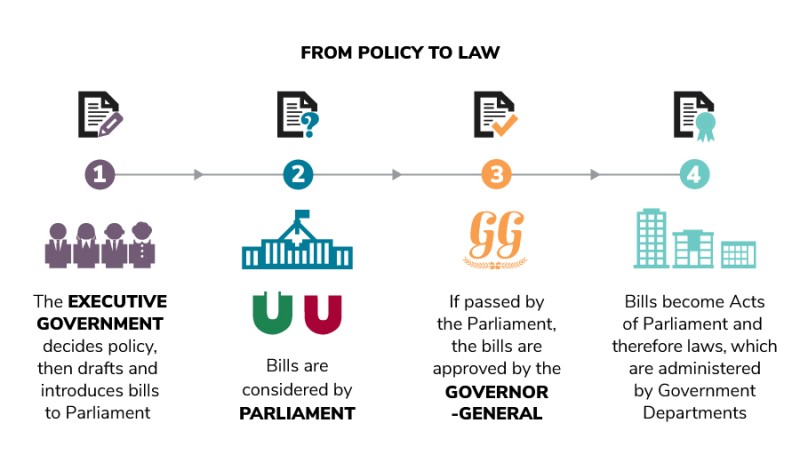Do foreign policy decisions have to be voted on by parliament or are they solely the responsibility of the Department of Foreign Affairs?
A policy is a plan of action on an issue, such as education or health. Policy can be developed by the government, a political party, members of parliament or a government department.
Sometimes a new law or a change to an existing law is required for a policy to be put into action. Only the Australian Parliament can make and change laws for Australia.
Government departments (such as the Department of Foreign Affairs and Trade) assist ministers to develop policy and implement laws. Ministers work with their department, community organisations and professional associations to prepare bills – proposals for new laws or changes to existing laws. If a bill becomes a law, the minister and their department are responsible for putting the law into action.
Sometimes Parliament gives the power to make decisions about the details of these laws to the relevant minister or government department. This is called delegated law because the power has been delegated to that person or department. The Parliament has the right to overrule these delegated decisions if it does not agree with them.
From policy to law.

Parliamentary Education Office (peo.gov.au)
Description
This diagram illustrates the role of executive government in turning policy into law.
1. The executive government decides policy then drafts and introduces bills to the Parliament.
2. Bills are considered by the Parliament.
3. If passed by the Parliament, the bills are approved by the Governor-General.
4. Bills become Acts of Parliament and therefore laws, which are administered by government departments.
This work is licensed under a Creative Commons Attribution-NonCommercial-NoDerivs 3.0 Unported License.
You are free to share – to copy, distribute and transmit the work.
Attribution – you must attribute the work in the manner specified by the author or licensor (but not in any way that suggests that they endorse you or your use of the work).
Non-commercial – you may not use this work for commercial purposes.
No derivative works – you may not alter, transform, or build upon this work.
Waiver – any of the above conditions can be waived if you get permission from the copyright holder.
